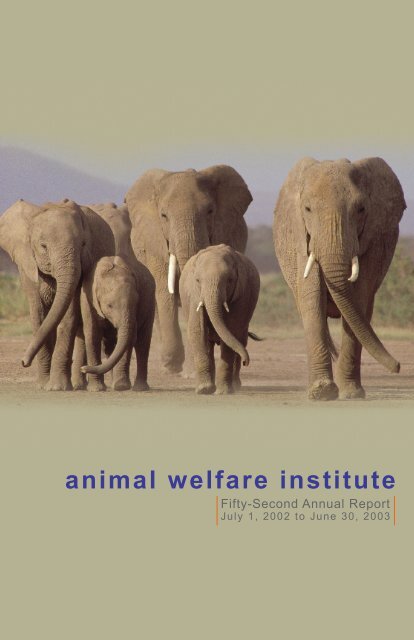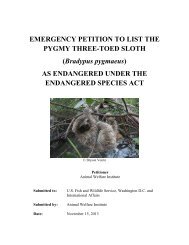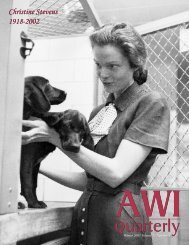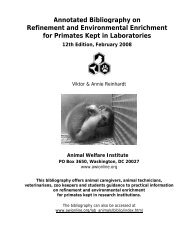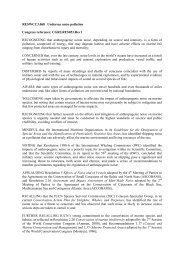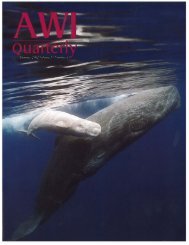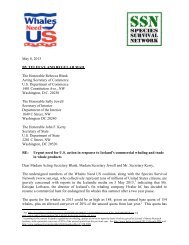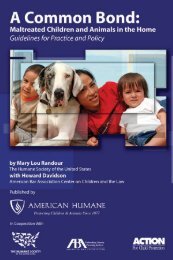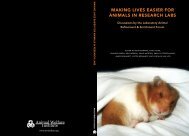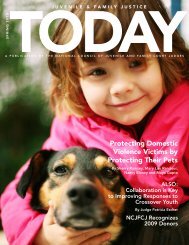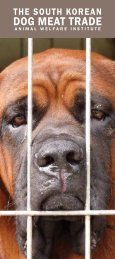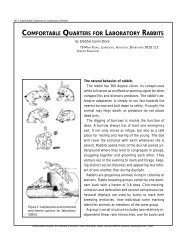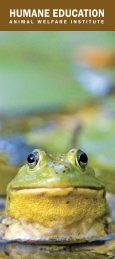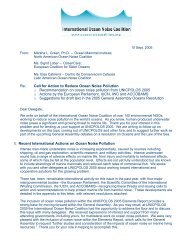2002-2003 - Animal Welfare Institute
2002-2003 - Animal Welfare Institute
2002-2003 - Animal Welfare Institute
You also want an ePaper? Increase the reach of your titles
YUMPU automatically turns print PDFs into web optimized ePapers that Google loves.
animal welfare institute<br />
Fifty-Second Annual Report<br />
July 1, <strong>2002</strong> to June 30, <strong>2003</strong>
dear friend<br />
The <strong>Animal</strong> <strong>Welfare</strong> <strong>Institute</strong> (AWI) is a non-profit charitable organization<br />
founded in 1951 to reduce the sum total of pain and fear inflicted on animals<br />
by humans.<br />
Our specific goals are:<br />
In 1951, Dr. Albert Schweitzer gave his<br />
• Humane treatment of<br />
permission to the <strong>Animal</strong> <strong>Welfare</strong> <strong>Institute</strong><br />
laboratory animals and<br />
to strike a medal in his honor to be<br />
the development and<br />
presented for outstanding achievement in<br />
use of non-animal testing<br />
the advancement of animal welfare.<br />
methods.<br />
In granting his permission, Dr. Schweitzer<br />
• Preservation of species wrote, “I would never have believed that<br />
threatened with extinction my philosophy, which incorporates in our<br />
and protection for wildlife in ethics a compassionate attitude toward<br />
international trade.<br />
all creatures, would be noticed and<br />
• Reform of cruel treatment<br />
recognized in my lifetime.”<br />
of farm animals intensively<br />
confined in factories and an<br />
end to inhumane slaughter.<br />
• Regulation of transport<br />
conditions for all animals.<br />
• Ban on steel jaw leghold<br />
traps and reform of<br />
other cruel methods<br />
for controlling wildlife<br />
populations.<br />
• Encouragement of humane<br />
science teaching and<br />
prevention of painful<br />
experiments on animals by<br />
high school students.<br />
Nearly twenty-five years ago, while a student in college, I began<br />
interning at the <strong>Animal</strong> <strong>Welfare</strong> <strong>Institute</strong>. I continue to work for AWI because<br />
of my commitment to the organization’s objectives, an appreciation for AWI’s<br />
common sense approach, and recognition of its ability to achieve so much<br />
for the animals on a modest budget. I hope that you share my enthusiasm for<br />
AWI and will help us continue our work.<br />
This Annual Report shows the myriad ways in which AWI is fighting<br />
against powerful commercial interests in America and across the globe who<br />
harm or kill animals out of avarice. We are confronting corporate agriculture,<br />
which treats animals as mere commodities, brutally slaughters horses to<br />
satisfy a foreign market, and treats pigs, chickens and other farm animals<br />
with no accommodation for their basic care and needs. We are battling the<br />
wildlife dealers who want to kill threatened and endangered species to sell<br />
their parts and products internationally. We are combating the international<br />
trade bureaucrats who are determined to eviscerate hard-won animal<br />
protection laws in the name of so-called “free trade.” We are continuing<br />
our long-standing campaign to “Save the Whales” as the whaling nations,<br />
Japan, Norway and Iceland, seek to increase the slaughter of these majestic<br />
creatures of the sea.<br />
Sadly, there is much to be done, as animals the world over are in<br />
desperate need. Though we may seem to face insurmountable odds, and<br />
at times heart-wrenching setbacks, with your kind and generous support,<br />
we can continue to make a difference for the animals. We can ease their<br />
suffering, and we will persevere until we prevail.<br />
Sincerely,<br />
Cover photo by Gerry Ellis/Minden Pictures
wild animals<br />
AWI is at the forefront of global efforts to protect wildlife including threatened<br />
and endangered species such as elephants, bears, tigers, chimpanzees, turtles<br />
and myriad other animals. Significant decisions were taken this past year<br />
for animals who are threatened with extinction but are traded internationally.<br />
Some are destined to become pets or be put on public display; others killed for<br />
clothing, jewelry, curios, trophies, medicines and food.<br />
As we have for thirty years, AWI staff played a vital role in the deliberations<br />
of the Convention on International Trade in Endangered Species of Wild<br />
Fauna and Flora (CITES), which had its twelfth meeting in Santiago, Chile,<br />
in November <strong>2002</strong>. AWI staff prepared influential documents encouraging<br />
wise conservation decisions and distributed them to the delegates who represented<br />
more than one hundred and sixty nations. We strongly advocated the<br />
increased protection for certain shark species, Black Sea bottlenose dolphins,<br />
turtles and parrots. We also helped beat back efforts to weaken protection for<br />
whales and hawksbill sea turtles. Our high profile on these life-or-death issues<br />
facing the wildlife of the world will continue through the next CITES meeting in<br />
Bangkok, Thailand, in October 2004 and beyond.<br />
In the months following the CITES meeting, AWI’s Adam Roberts gave<br />
guest lectures on CITES to graduate students at two schools on the East<br />
AWI continues its important campaign to protect all bears from poachers<br />
and profiteers.<br />
Ian McAllister/www.raincoast.org<br />
1
Coast: Tufts University and the University of Maryland. AWI’s international<br />
presence on wildlife trade matters is ever-increasing.<br />
AWI has also campaigned to keep threatened species free and protect<br />
those threatened and endangered animals already in captivity. We fought<br />
against the importation of eleven young elephants from Swaziland who were<br />
targeted for importation to two enclosures in U.S. zoos where they would be<br />
put on display. As well, we are plaintiffs in a lawsuit against Ringling Bros. &<br />
Barnum Bailey Circus for routine beatings of endangered Asian elephants.<br />
The case against Ringling is proceeding well and we hope for a ruling in our<br />
favor in the coming year.<br />
In line with our mission to educate as many people in the U.S. and abroad<br />
of the threats facing the world’s wildlife, AWI has undertaken an ambitious<br />
project to publish a new edition of our incredibly popular Endangered Species<br />
Handbook as an exclusive on-line web publication. The new volume will<br />
explore the endemic species in Madagascar, threats to endangered species<br />
including the fur trade, commercial whaling, and trade in bushmeat, and offer<br />
in-depth analysis of what actions need to be taken to prevent the further decline<br />
of the world’s most at risk species. We anticipate launch of the site in 2004.<br />
marine animals<br />
In August, AWI traveled to Costa Rica and joined other wildlife advocates and<br />
twelve countries to set up the Inter-American Convention for the Protection<br />
and Conservation of Sea Turtles, the first regional conference to attempt a<br />
comprehensive plan to stop the precipitous collapse of many species of turtles.<br />
A position paper authored by AWI and others urging dramatic steps such<br />
as a moratorium on pelagic long-lining in the Pacific, the stringent protection of<br />
nesting beaches, a prohibition on chemical and sound pollution in turtle areas,<br />
and a total ban on the trade in sea turtle parts, was welcomed by the parties.<br />
In February, AWI began addressing Cuba’s captive dolphin trade. Over<br />
the last decade, dozens of resident bottlenose dolphins have been captured<br />
by the National Aquarium of Havana and exported to Mexico and the Caribbean<br />
to be used in the plethora of new exploitative swim-with-the-dolphin<br />
programs aimed at tourists and dolphin-assisted-therapy facilities. Officials at<br />
both the aquarium and at the capital building in Havana vigorously defended<br />
Dolphins in captivity are incapable of reaching the graceful speed of this<br />
long-beaked common dolphin.<br />
the practice insisting that the dolphins were only sent to educational facilities.<br />
Concurrently, an investigation was begun within the U.S. government into<br />
whether the purchase of Cuban dolphins by the American owners of Dolphin<br />
Fantaseas (Caribbean) and Dolphin Discovery (Cancun, Mexico) violated federal<br />
prohibitions on trading with Cuba.<br />
The International Whaling Commission (IWC) held its annual meeting in<br />
Berlin, Germany in June. Just before it opened, AWI participated in an event<br />
at the Tempodrome that contrasted the piercing emissions of the U.S. Navy’s<br />
Low Frequency Active Sonar with the lovely musical language of whales and<br />
dolphins. The facility is unique—a large body temperature swimming pool/<br />
concert hall where visitors can not only hear broadcast sounds but feel them.<br />
At the IWC meeting, despite opposition from whaling countries and their supporters,<br />
a Mexican proposal to set up a new major Conservation Committee<br />
within the Commission to review environmental threats to whale populations<br />
won broad support. AWI strongly backed the concept recognizing the threats<br />
to marine mammals posed by toxic and sound pollution, climate change and<br />
extensive incidental catch in commercial fishing operations.<br />
Here at home, AWI continues to work for the protection of the beloved<br />
Florida manatee, which remains under assault through a campaign of fear<br />
and misinformation by developers and the boating industry. The most serious<br />
threat is an attempt to downlist them from endangered to threatened by the<br />
State of Florida. AWI continues to oppose this dangerous proposal.<br />
Jim Nahmens/www.natures-spirit.com<br />
2 3
farm animals<br />
This year AWI increased public awareness about the plight of animals in food<br />
factories and advocated humane alternatives. We are contacted daily by<br />
people who want to know what they can do to help farm animals. In response<br />
we send guidance materials, support community activists fighting proposed<br />
and existing concentrated animal feeding operations and visit farmers<br />
interested in joining AWI’s humane husbandry program.<br />
To ensure diligent growth and success of our humane husbandry<br />
program, staff continue to develop humane husbandry standards for veal<br />
calves, dairy cows and ducks. We have already finished standards for pigs<br />
and rabbits and anticipate work on standards for laying hens, chickens<br />
and sheep early in 2004. We conducted farm visits to assist in ensuring<br />
conformance with our standards, and since we are concerned about every<br />
aspect of each animal’s life, we also visited slaughterhouses. These trips give<br />
us the opportunity to constantly evaluate and improve our program.<br />
AWI is working with a growing number of retailers who are committed to<br />
the humane treatment of animals. Increasingly executives recognize that it<br />
behooves them to respond to consumer pressure seeking proper treatment<br />
of animals. In a country where the agricultural industry lobbies Congress to<br />
the animals’ detriment, decent treatment of farm animals will come about<br />
when consumers reject products from cruel animal factories. To this end, AWI<br />
published new farm animal related educational materials and made it possible<br />
for humane family farmers to be present in grocery stores to meet and better<br />
educate customers.<br />
AWI staff advocated the humane treatment of farm animals at scientific,<br />
academic, government and industry-sponsored conferences. We describe<br />
how animals are unable to express their natural behaviors in industrial<br />
systems that rely on confinement and mutilations such as tail docking<br />
of pigs and debeaking of laying hens. Of equal importance is our ability<br />
to convey our firsthand knowledge about humane alternatives to these<br />
brutal systems.<br />
In the coming months, in addition to developing standards for all animals,<br />
we will fiercely fight animal cloning on the grounds that it causes tremendous<br />
suffering and oppose the subtheraputic use of antibiotics and the irradiation<br />
of meat. Furthermore, as the American Veterinary Medical Association<br />
reconsiders its stance on use of gestation crates for pregnant pigs, AWI will<br />
express vehement opposition to this unnecessary cruelty.<br />
laboratory animals<br />
Wendy Swann/AWI<br />
AWI reported on the inhumane practice of docking cows’ tails and created<br />
humane husbandry standards for dairy cows. Humane standards to improve<br />
the lives of cows raised for beef are in development.<br />
How can stress reactions during the cage cleaning procedure be minimized?<br />
How can aggression among males, especially male mice, be minimized or<br />
avoided? Can baboons be housed safely in pairs? What is the cause of selfmutilation,<br />
and how can this ethopathology be cured? What is the scientific<br />
significance of stereotypical locomotion? What are the best ways to enrich<br />
the living quarters of frogs kept in laboratories? These were among more than<br />
100 questions posed for discussion during the past year on the Laboratory<br />
<strong>Animal</strong> Refinement and Enrichment Forum, an internet group, established in<br />
October <strong>2002</strong> by Dr. Viktor Reinhardt, AWI’s Laboratory <strong>Animal</strong> Advisor, for the<br />
exchange of information to improve the handling and housing of animals used<br />
in research. Open to all laboratory personnel, this discussion seeks to promote<br />
animal welfare and improve scientific methodology by avoiding, eliminating or<br />
reducing husbandry-related stress.<br />
To further assist animals used for experimentation, AWI set up a whistleblower<br />
web site for the reporting of any problems related to the care and treat-<br />
4 5
awi quarterly<br />
ment of animals in the laboratory. We have responded to complaints received<br />
and have sought resolutions to the problems cited by the individuals, many of<br />
whom chose to remain anonymous. Some of the situations necessitate longterm<br />
scrutiny and investigation.<br />
Frustrated with the long-standing failure of the U.S. Department of Agriculture<br />
(USDA) to adequately protect non-human primates who are used for<br />
experimentation and exhibition, AWI joined the <strong>Animal</strong> Legal Defense Fund<br />
and three individual plaintiffs in suing the federal government. Primates are<br />
legally entitled to a physical environment that promotes their psychological<br />
well-being under the <strong>Animal</strong> <strong>Welfare</strong> Act, but many are still maintained in substandard<br />
facilities that ignore their fundamental needs including provision of<br />
companions and a stimulating environment.<br />
In 1999 USDA published a draft Primate Policy, acknowledging that this<br />
document was critical to its compliance efforts. To date USDA has not finalized<br />
this binding document, thus failing to fulfill its responsibility to the animals in<br />
need. The Primate Policy, based on a thorough review of the scientific literature<br />
and extensive feedback from veterinarians, primatologists and USDA inspectors,<br />
inexplicably seems to have been lost in a bureaucratic morass. Our<br />
lawsuit requires USDA to make a final decision on its Primate Policy. As we go<br />
to press, we await the judge’s verdict.<br />
The AWI Quarterly is distributed to approximately 23,000 individuals and<br />
organizations including public libraries, deans of medical and veterinary<br />
schools, animal protective organizations, teachers, scientists and AWI members.<br />
Following are summaries of some of the articles from the past year.<br />
Fall <strong>2002</strong> Volume 51 Number 4<br />
• A special section considers topics before<br />
the <strong>2002</strong> Meeting of the Conference of the<br />
Parties to the Convention on International<br />
Trade in Endangered Species (CITES), including:<br />
the ongoing threats facing rhinos<br />
and bears, global parrot smuggling, and<br />
the problems associated with consuming<br />
turtles as food as well as the risks of allowing<br />
trade in green turtles from a farm in<br />
the Cayman Islands.<br />
• AWI attended the massive World Summit<br />
on Sustainable Development (WSSD) in<br />
Johannesburg, South Africa. Expectations<br />
were not met as global decision-makers<br />
failed to make concrete, substantive commitments to improve the lives of<br />
the poor while protecting the environment and its natural inhabitants. The<br />
final agreement, however, does mention the importance of family farming,<br />
biodiversity protection, and ecotourism. During the WSSD, the Great Apes<br />
Survival Project was relaunched to raise global awareness of the plight of the<br />
great apes whose populations are dwindling.<br />
• Long-running problems associated with marine mammal protection are<br />
chronicled: The attempts to return Keiko from the movie Free Willy to the<br />
wild, risks posed to orcas as a result of unsound tourism, injuries and deaths<br />
to right whales from fishing nets and the Navy’s arm-twisting efforts to blow<br />
its deadly Low Frequency Active Sonar throughout the oceans.<br />
AWI is devoting much effort to enrich the lives of non-human primates still<br />
confined alone in barren enclosures.<br />
• Ooh-Mah-Nee Farm in western Pennsylvania had a terrific open house,<br />
showing off its rescued cows, sheep, goats, pigs, rabbits, chickens and<br />
turkeys. Ooh-Mah-Nee provides a stark contrast to the world of intensive<br />
agriculture from which its residents came. No more confining crates and<br />
cages and cement floors for these lucky animals—it’s one hundred acres of<br />
peaceful land.<br />
6 7
Winter <strong>2003</strong> Volume 52 Number 1<br />
• AWI mourns the passing of its Founder<br />
and President, Christine Stevens, detailing<br />
her more than five decades of tireless work<br />
on behalf of all animals. Christine educated<br />
the public and policy-makers about<br />
the need to treat animals humanely. She<br />
also lobbied Congress and Presidential<br />
Administrations for laws and regulations<br />
to protect animals. A two page photo-montage<br />
illustrates her far-reaching efforts.<br />
• Not only did AWI have an incredibly successful<br />
CITES meeting in Santiago, Chile, but<br />
we, as always, led the effort to honor those<br />
wildlife law enforcement officers across<br />
the globe who work so diligently to protect wildlife from well-armed poachers.<br />
In coordination with the Species Survival Network, AWI presented the Clark<br />
R. Bavin Wildlife Law Enforcement Awards to individuals from Kenya, Costa<br />
Rica, Uganda, the U.S. and Canada. A new DVD film is also available about efforts<br />
to prevent poaching of Africa’s elephants called, “Wanted Dead or Alive?”<br />
The film is produced by the African Environmental Film Foundation.<br />
• Sanctuaries are always hard pressed for two things: money and room. AWI<br />
has offered modest assistance to the “Siglo XXI” primate rescue center outside<br />
Santiago, Chile, where roughly 100 primates, rescued from laboratories,<br />
circuses and the pet trade, reside. Elba Almazan and her family provide loving<br />
care to all of the residents of the Center and, with our help, have purchased<br />
a bigger piece of land to construct a new sanctuary facility.<br />
• The fight continues in Florida to make the state’s waterways safer for manatees.<br />
The U.S. Fish and Wildlife Service has done its best over the years to<br />
avoid the designation and enforcement of new manatee protection zones<br />
there. But, as a result of a lawsuit that includes AWI among the plaintiffs, a<br />
new deadline has been imposed to establish these protected areas.<br />
• After a long crusade, the remaining six polar bears suffering unbearably in<br />
the Suarez Brothers Circus were confiscated by the U.S. Fish and Wildlife<br />
Service and placed in different U.S. zoos, more suitably equipped to meet<br />
the biological needs of these animals. In the circus, they were reportedly<br />
subjected to temperatures that reached above 100 ◦ F and sometimes went<br />
without cool pools of water or air conditioned holding trailers.<br />
• Dominion, thought by many to be the most influential book on the ethical<br />
treatment of non-human animals in years, was reviewed.<br />
Spring <strong>2003</strong> Volume 52 Number 2<br />
• A campaign is in full swing in the European<br />
Union to prohibit the importation of<br />
exotic birds, especially parrots. The U.S.<br />
successfully banned the importation of<br />
birds protected under CITES in 1992, but<br />
the E.U. has lagged behind in following<br />
our wise lead. The trade of wild birds is<br />
incredibly inhumane—birds suffer high<br />
levels of mortality during capture, holding<br />
and transport, which threatens the longterm<br />
viability of many fragile species.<br />
• Russian orcas are threatened by the international<br />
live animal trade, where they<br />
may be caught cruelly in their frigid ocean<br />
homes, separated from their closely-bonded social pods and sent to marine<br />
parks and aquaria across the globe. AWI has sponsored an orca study in the<br />
waters of Kamchatka.<br />
• Dolphins are under massive global attack. Not only are there still legislative<br />
and legal battles in the U.S. to keep dolphin-deadly tuna from being sold on<br />
the American market, but dolphins are killed in South America and the Far<br />
East. Hardy Jones reports on the thousands of dolphins slaughtered in a<br />
bloody massacre by Japanese fisherman in Futo. Meanwhile, Stefan Austermühle<br />
tells that at least 1,000 dolphins are killed every year off the coast of<br />
Peru for their coveted meat.<br />
• AWI mourns the passing of a good friend, Dr. John Kullberg, who served<br />
as the President of AWI’s companion organization, the Society for <strong>Animal</strong><br />
Protective Legislation, at the time of his death. Dr. Kullberg’s sister, Marjorie<br />
Cooke, remains on the AWI Board of Directors.<br />
• The Government of the Republic of Slovenia may be playing “fast and loose”<br />
with its bear population figures in order to artificially inflate the number of domestic<br />
brown bears that may be available for hunters’ bullets and their desire<br />
for bear trophies. The Deliverance of Dancing Bears, a wonderful children’s<br />
book about the cruel practice of forcing bears to “dance” for money, is reviewed.<br />
• Opponents of intensive animal factories joined forces with Native Americans<br />
of the Rosebud Sioux Tribe in South Dakota to defeat Bell Farms’ efforts to<br />
exploit the tribe’s lands and build a confinement hog operation there. A complex<br />
and tortuous legal battle over the facility has been fought since 1998<br />
and it looks as though the defense of the native lands is going to win out over<br />
corporate greed.<br />
8 9
Summer <strong>2003</strong> Volume 52 Number 3<br />
• The burgeoning trade in exotic and increasingly<br />
dangerous pets must be stopped.<br />
People are no longer satisfied with dogs<br />
and cats and are seeking pets that are<br />
“bigger and badder” than everyone else’s:<br />
lions, jaguars, tigers, bears, baboons and<br />
boa constrictors. Not only do these animals<br />
pose a threat from their innate “wildness,”<br />
but they likely carry diseases that can be<br />
harmful if not deadly to humans: salmonella,<br />
SARS and monkeypox.<br />
• AWI is launching a massive campaign<br />
in time for the Ministerial Meeting of the<br />
World Trade Organization (WTO). For<br />
the first time, we will have a representative<br />
inside the meeting speaking to delegates about the need for enhanced<br />
attention to animal welfare issues during of the latest round of decisions. This<br />
is especially true with respect to agriculture issues, such as subsidies that<br />
may be paid to family farmers who raise their animals humanely. AWI is also<br />
organizing throngs of demonstrators in dolphin costumes outside the meeting,<br />
reminiscent of the popular sea turtles who marched in Seattle.<br />
• AWI has launched two new brochures in its illustrative and informative series:<br />
one on Free Trade and another on Farm <strong>Animal</strong>s.<br />
• Willow Creek Farm in Wisconsin has been welcomed into the fold of farmers<br />
who meet AWI’s humane husbandry standards for pigs. Tony Renger is a<br />
fourth generation farmer and he and his wife, Sue, market their pig products<br />
directly to customers in the area.<br />
• AWI has merged with its companion organization, the Society for <strong>Animal</strong> Protective<br />
Legislation (SAPL), to better serve both of their constituencies. Three<br />
important bills highlighted: the Crane Conservation Act, the Marine Turtle<br />
Conservation Act and the bill to end the use of steel jaw leghold traps. As well,<br />
SAPL continues to work on legislation banning the transport and commercialization<br />
of horses for human consumption and the practices of random source<br />
dealers selling dogs and cats into biomedical research.<br />
• Congressional efforts to undermine the vital protection afforded marine mammals<br />
by the Marine Mammal Protection Act are intense. The Department of<br />
Defense Authorization Bill and legislation to reauthorize the Marine Mammal<br />
Protection Act both contain provisions to make it easier to “harass” marine<br />
mammals and attain “incidental take” permits to kill large numbers of whales,<br />
dolphins and other precious mammals of the sea.<br />
S p e e c h e s M a d e a n d M e e t i n g s<br />
Attended by AWI Representatives<br />
2 0 0 2<br />
• “Antibiotic-Free Day” Press Conference, cosponsored with Sierra Club, Minneapolis,<br />
MN, July 2<br />
• Speeches by Adam M. Roberts, at the <strong>Animal</strong> Rights <strong>2002</strong> Conference, on<br />
“Wildlife Protection Laws,” July 2, and “Trade Issues,” July 3<br />
• Up the River Endeavors Coalition, Martha’s Vineyard, MA, July 10-14<br />
• Powder River Basin Resource Council Board Meeting, Barlow Ranch, Gillette,<br />
WY, July 13<br />
• Presentation by Diane Halverson at The Holly Edison Wildlife Rehabilitation<br />
Center, Woodstock, NY, July 13<br />
• Speech by Ben White on the effect of globalization on animal protection at the<br />
San Juan Summer Celebration, San Juan Island, WA, July 21<br />
• “Legislator Appreciation Day” and open house for alternative swine housing<br />
research and demonstration project, University of Minnesota, West Central<br />
Research and Outreach Center, Morris, MN, August 2<br />
• Inter-American Convention for the Protection and Conservation of Sea<br />
Turtles, San Jose, Costa Rica, August 6-8<br />
• Presentation by Viktor Reinhardt on “Training macaques to voluntarily co-operate<br />
during two common procedures: Blood collection and capture of grouphoused<br />
animals,” XIXth Congress of the International Primatological Society,<br />
Beijing, China, August 6<br />
• Statement by Diane Halverson on factory farm reliance on antibiotics to compensate<br />
for poor housing and husbandry, Sierra Club press conference in<br />
front of Cargill, Inc. headquarters, Wayzata, MN, August 13<br />
• Meeting with David Bayvel, Director, <strong>Animal</strong> <strong>Welfare</strong>, Ministry of Agriculture<br />
and Forestry and Professor David Mellor, Director of <strong>Animal</strong> <strong>Welfare</strong><br />
Science, Massey University, both of New Zealand, August 16<br />
• Meeting with the U.S. Fish and Wildlife Service’s delegation to the Conference<br />
of the Parties to the Convention on International Trade in Endangered Species<br />
(CITES) to discuss agenda items for the upcoming meeting, August 20<br />
• Ben White interviewed by “Rolling Thunder Review” during a presentation by<br />
Lori Wallach of Public Citizen, Renton, WA, August 24<br />
• Land Stewardship Project 20 th Anniversary Celebration and Member Meeting,<br />
Jordan, MN, August 24<br />
• World Summit on Sustainable Development, Johannesburg, South Africa,<br />
August 26-September 4<br />
• Second International Workshop, “Assessment of <strong>Animal</strong> <strong>Welfare</strong> at Farm and<br />
Group Level,” University of Bristol, Bristol, UK, September 2-5<br />
10 11
• Niman Ranch “Farmer Appreciation Dinner,” Hotel Fort Des Moines, Des<br />
Moines, IA, September 14<br />
• Presentation by Diane Halverson on AWI’s humane pig husbandry standards<br />
for the Future Trends in <strong>Animal</strong> Agriculture Symposium at the U.S. Department<br />
of Agriculture, September 18<br />
• “Biotech in the Barnyard: Implications of Genetically Engineered <strong>Animal</strong>s,”<br />
sponsored by Pew Initiative on Food and Biotechnology and Center for Veterinary<br />
Medicine, Dallas, TX, September 24-25<br />
• “<strong>Animal</strong> Cloning and the Production of Food Products,” sponsored by Pew<br />
Initiative on Food and Biotechnology and Center for Veterinary Medicine and<br />
the U.S. Food and Drug Administration, Dallas, TX, September 26<br />
• Speech by Diane Halverson on cruelty of pig factory farming and humane<br />
alternatives at the White Dog Cafe forum, Philadelphia, PA, September 30<br />
• Comments by Wendy Swann on the “Draft Guidance for Industry: Evaluating<br />
the Safety of Antimicrobial New <strong>Animal</strong> Drugs with Regards to Their Microbiological<br />
Effects on Bacteria of Human Health Concern” at FDA’s Center for<br />
Veterinary Medicine public meeting, Rockville, MD, October 2<br />
• Baum Forum “A Growing Concern,” New York, NY, October 5-6<br />
• Speech by Ben White on problems with globalization at Tonasket Barter Fair,<br />
Tonasket, WA, October 16<br />
• Agribusiness Accountability Initiative Forum, Chicago, IL, October 18-19<br />
• Presentation by Marlene Halverson on current animal welfare issues to the<br />
<strong>Animal</strong> <strong>Welfare</strong> Committee, U.S. <strong>Animal</strong> Health Association, St. Louis, MO,<br />
October 21<br />
• Public information meeting and feedback session on State progress in developing<br />
policy regarding antibiotics in animal feeds, Minnesota Department of<br />
Public Health, St. Paul, MN, October 21<br />
• Press Conference by the Species Survival Network (Adam M. Roberts, moderator)<br />
in advance of the Twelfth Meeting of the Conference of the Parties to<br />
CITES, October 22<br />
• Speech by Ben White on sustainable development at the Spring Street School<br />
forum, San Juan Island, WA, October 24<br />
• Meeting of AWI’s Board of Directors, October 24 (conference call), November<br />
18, April 2, <strong>2003</strong> and June 9, <strong>2003</strong> (Alexandria, VA)<br />
• Presentation by Diane Halverson discussing how AWI’s pig husbandry standards<br />
allow the animals to fulfill their natural behavior, North Carolina Agricultural,<br />
Technical and State University, Greensboro, NC, October 25<br />
• Presentation by Diane Halverson on the relations between animal welfare and<br />
environmental protection, Sierra Club Conference, Franklin, KY, October 26<br />
• Educational exhibit at the American Association for Laboratory <strong>Animal</strong> Science,<br />
San Antonio, TX, October 28-30<br />
• Twelfth Meeting of the Conference of the Parties to CITES, Santiago, Chile,<br />
November 3-15<br />
• Meeting with Alexey Yablokov of AWI’s International Committee regarding<br />
marine mammal and environmental issues, November 5<br />
• “Ecolabels and the Greening of the Food Market,” sponsored by Tufts University,<br />
Boston, MA, November 7-8<br />
• Greener Fields meeting on ecolabelling, Boston, MA, November 9-10<br />
• Fauna Australis International Meeting about Wildlife Conservation, Santiago,<br />
Chile, November 9<br />
• Speech by Wendy Swann at Public Citizen press event opposing food irradiation,<br />
November 14<br />
• Presentation by Diane Halverson on the role of chefs in influencing the welfare<br />
of farm animals, Women Chefs and Restaurateurs Conference, Boston, MA,<br />
November 18<br />
• Presentation by Diane Halverson on providing primer on the ways animal factories<br />
violate the natural behavior of farm animals to the <strong>Animal</strong> Grantmakers,<br />
Glaser Progress Foundation, Seattle, WA, November 19<br />
• Hosted forum on whale watching and whales, San Juan Island, WA, December 6<br />
• Sierra Club, North Star Chapter meeting, Cannon Falls, MN, December 14<br />
• Rice County Feedlot Front meeting, Northfield, MN, December 12<br />
2 0 0 3<br />
• Meeting with Yvan LaFleur, Director of the Environment Branch of the Canadian<br />
Wildlife Service, to discuss development of global wildlife law enforcement<br />
network, January 14<br />
• Rice County Feedlot Front meeting, Northfield, MN, January 15<br />
• Guest lecture by Adam M. Roberts on CITES and wildlife trade, Tufts University<br />
Center for <strong>Animal</strong>s and Public Policy, Boston, MA, February 4<br />
• “Local Food Systems, Local Decisions – In Search of True Security,” Pennsylvania<br />
Sustainable Agriculture Association Annual Conference, State College,<br />
PA, February 6-8<br />
• Presentation by Diane Halverson and Marlene Halverson on AWI’s farm<br />
animal program developments and prohibition of tail docking, Niman Ranch<br />
Annual Winter Meeting, Ames, IA, February 10<br />
• McDonald’s <strong>Animal</strong> <strong>Welfare</strong> Advisory Council meeting, Oak Brook, IL,<br />
February 13<br />
• Meeting with Matthew Scully, author of Dominion, February 14<br />
• Meeting to discuss the vital role of the <strong>Animal</strong> <strong>Welfare</strong> Information Center with<br />
Peter Young, Director, National Agricultural Library, Beltsville, MD, February 20<br />
• House and Senate Hearings on legislation to ban the gestation crate housing<br />
of sows, Maryland State Legislature, Annapolis, MD, February 24-25<br />
• Meeting with Enrique Moret Hernandez, Director of International Cooperation<br />
in the National Capital of Cuba, about dolphin trade and CITES, Havana,<br />
Cuba, February 24<br />
• Meeting with assistant director of the National Aquarium of Havana concerning<br />
the dolphin trade, Havana, Cuba, February 24-25<br />
12 13
• Strategy meeting on the tuna-dolphin issue, February 25<br />
• Marine Mammal Protection Coalition meeting, February 27<br />
• Sustainable Agriculture and Rural Development meeting, March 4<br />
• Congressional hearing on nutria eradication in Maryland and Louisiana, March 6<br />
• Meeting regarding enforcement of the <strong>Animal</strong> <strong>Welfare</strong> Act with Chester<br />
Gipson, Acting Deputy Administrator, <strong>Animal</strong> Care, USDA-APHIS, March 17<br />
• Meeting with partners involved in the United Nations Environment Program’s<br />
Great Apes Survival Partnership, March 17<br />
• Guest lecture on CITES and wildlife trade by Adam M. Roberts for University<br />
of Maryland graduate students, March 18<br />
• Speech by Ben White at a press conference and televised interviews against<br />
confining dolphins in captivity, Las Vegas, NV, March 19- 20<br />
• “Never Forgetting: Elephants and Ethics,” National Zoo’s Conservation and<br />
Research Center, Front Royal, VA, March 19-20<br />
• Memorial Service for AWI founding president, Christine Stevens, April 2<br />
• UFAW Symposium: “Science in the Service of <strong>Animal</strong> <strong>Welfare</strong>,” Edinburgh,<br />
Scotland, April 2-4<br />
• Alternative Swine Systems Program Task Force meeting, University of Minnesota,<br />
West Central Research and Outreach Center, Morris, MN, April 10<br />
• “Tour de Manure,” bus tour of animal factories and sustainable farms, cosponsored<br />
with Sierra Club, Carleton College, Northfield, MN, April 12<br />
• Speech by Ben White on the ties between animal protection, saving the Earth<br />
and democracy at Earth Day celebration, San Juan Island, WA, April 26<br />
• Presentation by Viktor Reinhardt on “Understanding <strong>Animal</strong>s,” Butteville Elementary<br />
School, Weed, CA, May 14<br />
• USDA “Future Trends in <strong>Animal</strong> Agriculture: The Science and Ethics Behind<br />
<strong>Animal</strong> Well-Being Assessment,” May 28<br />
• Presentation by Wendy Swann on humane treatment of animals at High<br />
Bridge Elementary School career day, Bowie, MD, May 30<br />
• Presentation by Diane Halverson at Waterkeeper Alliance Summit for Sustainable<br />
Pig Farming, Gettysburg, PA, June 7<br />
• Presentations by Cathy Liss to students at Mt. Vernon Community School on<br />
being kind to animals, Alexandria, VA, June 11<br />
• Speech by Ben White against Low Frequency Active Sonar at the Liquid<br />
Sound event, Berlin, Germany, June 14<br />
• International Whaling Commission, Berlin, Germany, June 16-19<br />
• National Wildlife Services Advisory Committee. Cathy Liss serves on the<br />
Committee. Riverdale, MD, June 24-25<br />
• Regular CITES Strategy and Board Meetings of the Species Survival<br />
Network<br />
A r t i c l e s i n P r i n t<br />
Garrett T <strong>2003</strong>. Pigs—American Style: An Interview, Gazeta Poznanska, 8-9,<br />
June 20. Poznan, Poland<br />
Garrett T <strong>2003</strong>. Against the Factory farm in Szydlowo: An Interview, Gazeta<br />
Poznanska, 4, May 24. Poznan, Poland<br />
Garrett T <strong>2003</strong>. Smithfield Wants to Enter EU Market, Zielony Sztandar, 3,<br />
June 1. Warsaw, Poland<br />
Kryda M <strong>2002</strong>. An Interview on <strong>Animal</strong> <strong>Welfare</strong> Act; Polska Agencja<br />
Informacyjna, 3, September 26. Warsaw, Poland<br />
Kryda M <strong>2002</strong>. An Interview on <strong>Animal</strong> <strong>Welfare</strong> Act, Rzeczpospolita, 6,<br />
September 28. Warsaw, Poland<br />
Kryda M <strong>2002</strong>. An Interview on Factory Farming, Nasz Dziennik, 3, January<br />
15. Warsaw, Poland<br />
Kryda M <strong>2003</strong>. An Interview on Factory Farms in Poland, Nasz Dziennik, 3,<br />
June 5. Warsaw, Poland<br />
Reinhardt V <strong>2002</strong>. Artificial weaning of calves: Benefits and costs. Journal of<br />
Applied <strong>Animal</strong> <strong>Welfare</strong> Science, 5, 251-255<br />
http://www.awionline.org/Lab_animals/biblio/jaaws7.html<br />
Reinhardt V <strong>2002</strong>. Addressing the social needs of macaques used for<br />
research. Laboratory Primate Newsletter, 41(3), 7-10<br />
http://www.brown.edu/primate/lpn41-3.html#vik<br />
Reinhardt V, Buchanan-Smith HM, Prescott MJ <strong>2002</strong>. Training macaques<br />
to voluntarily co-operate during two common procedures: Blood collection<br />
and capture of group-housed animals. XIXth Congress of the International<br />
Primatological Society, Abstracts–Caring for Primates, 182-183<br />
Reinhardt V, Reinhardt A <strong>2002</strong>. Database: Refinement and Environmental<br />
Enrichment for All Laboratory <strong>Animal</strong>s. <strong>Animal</strong> <strong>Welfare</strong> <strong>Institute</strong>,<br />
Washington, DC http://www.awionline.org/lab_animals/biblio/laball.htm<br />
Reinhardt V <strong>2002</strong>. The myth of the aggressive monkey. Journal of Applied<br />
<strong>Animal</strong> <strong>Welfare</strong> Science, 5, 321-330<br />
http://www.awionline.org/Lab_animals/biblio/jaaws8.html<br />
Reinhardt V (Ed) <strong>2003</strong>. Personnel / <strong>Animal</strong> Relationships: Affectionate or<br />
Neutral: A Discussion. Laboratory Primate Newsletter 42(1), 14-15<br />
http://www.brown.edu/Research/Primate/lpn42-1.html#relation<br />
Reinhardt V <strong>2003</strong>. Legal loophole for subminimal floor area for caged<br />
macaques. Journal of Applied <strong>Animal</strong> <strong>Welfare</strong> Science, 6, 53-56<br />
http://www.awionline.org/Lab_animals/biblio/jaaws9.html<br />
White, B <strong>2003</strong>. Letter to the editor concerning Peter Tyack, LFA, and court<br />
victory over his soundblasting of grey whales, Cape Cod Times. 22 January,<br />
<strong>2003</strong>. Cape Cod, MA<br />
Meetings took place in Washington, DC unless otherwise noted.<br />
14 15
S t a t e m e n t o f A c t i v i t i e s<br />
and Changes in Net Assets<br />
Statement of Functional Expenses<br />
Y e a r E n d e d J u n e 3 0 , 2 0 0 3<br />
A complete financial statement, audited by Rosenberg, Neuwirth & Kuchner, Certified<br />
Public Accountants, P.C., is available upon request from AWI or the New York State<br />
Board of Social <strong>Welfare</strong>, Albany, NY 12223.<br />
16 17
animal welfare institute<br />
Founded in 1951<br />
f o u n d e r<br />
Christine Stevens<br />
d i r e c t o r s<br />
Marjorie Cooke<br />
Roger Fouts, Ph.D.<br />
John Gleiber<br />
Fredrick Hutchison, Jr.<br />
Cathy Liss<br />
Cynthia Wilson, Chair<br />
o f f i c e r s<br />
Cathy Liss, President<br />
Cynthia Wilson, Vice President<br />
Fredrick Hutchison, Jr.,<br />
C.P.A, Treasurer<br />
Marjorie Cooke, Secretary<br />
s c i e n t i f i c c o m m i t t e e<br />
Marjorie Anchel, Ph.D.<br />
Gerard Bertrand, Ph.D.<br />
F. Barbara Orlans, Ph.D.<br />
Roger Payne, Ph.D.<br />
Samuel Peacock, M.D.<br />
Hope Ryden<br />
John Walsh, M.D.<br />
i n t e r n a t i o n a l c o m m i t t e e<br />
Aline de Aluja, D.M.V., Mexico<br />
Ambassador Tabarak Husain, Bangladesh<br />
Angela King, United Kingdom<br />
Godofredo Stutzin, Chile<br />
Agnes Van Volkenburgh, D.V.M., Poland<br />
Alexey Yablokov, Ph.D., Russia<br />
s t a f f a n d c o n s u l t a n t s<br />
Ava Armendariz, Graphic Designer<br />
Tom Garrett, Consultant for Rural Affairs<br />
John Gleiber, Assistant to the Officers<br />
Diane Halverson, Farm <strong>Animal</strong> Advisor<br />
Marlene Halverson,<br />
Farm <strong>Animal</strong> Economic Advisor<br />
Christopher J. Heyde, Research Associate<br />
Lynne Hutchison, Executive Secretary<br />
Nell Naughton, Mail Order Secretary<br />
Viktor Reinhardt, D.M.V., Ph.D.,<br />
Laboratory <strong>Animal</strong> Advisor<br />
Jennifer Rinick, Research Assistant<br />
Adam M. Roberts, Senior Research Associate<br />
Wendy Swann, Research Associate<br />
Ben White, Special Projects Consultant<br />
To any who would like to help assure the <strong>Animal</strong> <strong>Welfare</strong> <strong>Institute</strong>’s future through<br />
a provision in your will, this general form of bequest is suggested:<br />
I give, devise and bequeath to the <strong>Animal</strong> <strong>Welfare</strong> <strong>Institute</strong>, located in Washington,<br />
DC, the sum of $_____________ and/or (specifically described property).<br />
Donations to AWI, a not-for-profit corporation exempt under Internal Revenue Code<br />
Section 501(c)(3), are tax deductible. We welcome any inquiries you may have.<br />
In cases where you have specific wishes about the disposition of your bequest,<br />
we suggest you discuss such provisions with your attorney.<br />
Printed with soy ink on recycled paper.
A n i m a l W e l f a r e I n s t i t u t e<br />
P O B o x 3 6 5 0 , W a s h i n g t o n , D C 2 0 0 2 7 • w w w . a w i o n l i n e . o r g


